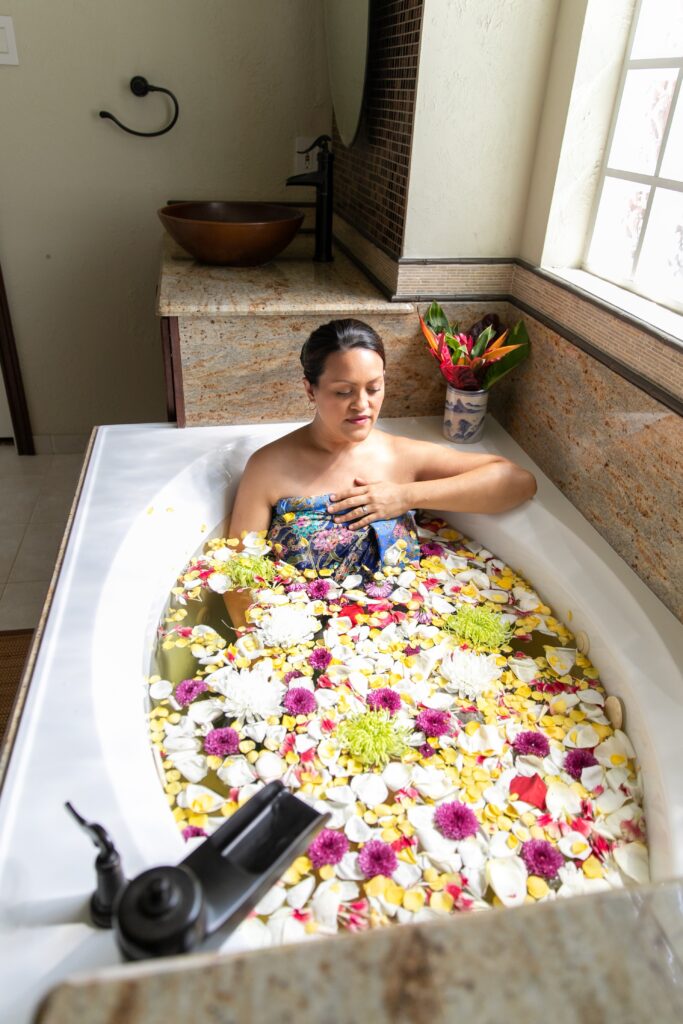I had my eldest son back in my home country of Malaysia. Despite not having the birth experience I really wanted (I tried having a shower at the hospital, but they must have thought me mad), I did have the best postpartum care during my confinement period. As we were living at my Grandparents house, which was also the house I grew up in, naturally my grandmother took on the task of caring for me with the help of my mother.
That first 44 days was filled with age-old traditional rituals that can be found in countries like Vietnam, China, India, Mexico and Morocco and most Southeast Asian countries. It was weeks filled with warmth, rest and being taken care of. I did not cook, do the laundry, or bathe my baby. My job was just learning how to breastfeed bub, eating freshly cooked foods, taking my herbal supplements, doing vaginal steaming, and getting massages.
There was also the belly binding ritual which is called bengkung. The bengkung is a cotton calico cloth about 10 metres long that is tied tightly upwards from your thighs right up to under your breasts. Some of the benefits of the bengkung is that it assists with your posture during breastfeeding, helps flatten the belly whilst keeping your body warm. Wearing the bengkung feels like all your bits, your uterus, your pelvic and vagina are all secure in one place. The bengkung also slows you down when you walk, which helps prevent heavy bleeding.
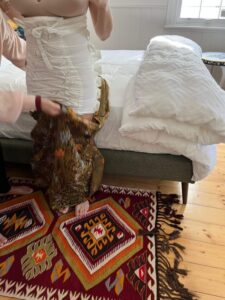
The heart of traditional postpartum ritual is on holistic healing. They emphasise on balancing the yin and yang of a woman’s body. A woman is considered in a yang (hot) state during pregnancy, she then loses heat through the birthing process, and is considered in a dangerously cold state afterwards. A woman who has just given birth has yin (cool) energy. She has lost blood and fluids that has kept her and her baby warm throughout pregnancy and the loss of the liquids has left her cold and weak with “open” nerves.
In fact, the Khmer of Cambodia call post birth sor sai kchey which literally means weak blood vessels. Their belief is that a Mother who feels cold can easily fall ill. If not during that first 6 weeks, it can be months or years down the road. Toas or chronic symptoms can manifest decades to come. The commonly presented symptoms are abdominal pain, weakness, headache, diarrhea, palpitations, weight loss, and poor appetite
The Chinese, the Malays, the Indians and all these other cultures then focus on restoring heat back into the new mother through various means. They truly believe in and strictly practice the rituals during this postpartum period. This lying in or confinement period can be anywhere between 40, 44 or 100 days depending on where you live. In Cambodia, a postpartum woman is considered a queen, because she has survived childbirth, which was not always assured due to lack of healthcare resources in Cambodia.
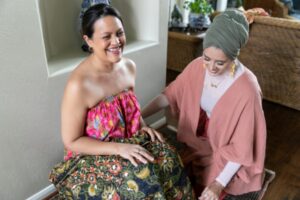
I had the honour of interviewing two women who are doing fantastic work on spreading traditional postpartum. Adilah Yelton of IBU DOULA from the USA was born to a Malay Mother and American Father. She is a certified birth and postpartum doula who has done her training in traditional Malay postpartum practice. Layla B. a British Moroccan is the founder of the Natural Birth and Breastfeeding Conference in the UAE, creator of the Nafsa Project School; the first online traditional Moroccan postpartum training. Her video on the journey of the Nafsa (new mother) has gone viral on Facebook with 3 million views. I hope our conversation will bring further understanding to how crucial the fourth trimester is for women. Whether you are a first-time mother or a fourth time, this is for you.
What are some postpartum practices that your culture does in terms of nourishing Mothers? In terms of food or other rituals and how do they benefit the mother?
Adilah: The Malay tradition in postpartum care is to rest for six weeks. And during that resting period the mother is being taken care of, fed warm foods, given weekly massages, binding the abdomen daily, body scrubs, hair and scalp treatments and more. We are very close to Ayurveda philosophy, in keeping the body warm and away from the cold in both foods and physical form. Postpartum recovery in the Malay culture is not to be taken lightly, it is a lot of scheduling, daily commitments, and allowing those around you to help.
Layla: We have lots of traditional postpartum practices in Morocco. This includes special nourishing foods, womb steams, hamam baths, closing the bones, belly binding and all-over general support.
How does traditional postpartum nurture the new Mother?
Adilah: It helps the mother heal, giving the time and tools to do so. It takes 2 to 4 weeks for the cervix to close 10cm, sometimes longer. And during that time your organs are shifting and shrinking, trying to find their regular places after being moved to the back and top of your body while the baby grows. Your bones are left open and loose from the hormone relaxin that helps the ligaments stretch for a growing baby and giving birth. There is so much happening that we do not see. And the traditional ways of nurturing a new mother gives the body the chance to fully recover without the stress of everyday life and expectations. The traditional ways respect the time that is needed to heal.
Layla: We nurture the new mother in Morocco traditionally by allowing her the space to just rest and bond with the baby. She is not expected to do any work, cook or clean. Women in the family nurture her by offering all sorts of different rituals as mentioned above.
Is there any taboo in your culture for the postpartum Mother?
Adilah: I think more mothers in SouthEast Asia feel the old ways are just that, old and meant for the past. They are stuck in this modern way of “get up and go”. This new thinking that we are meant to get back to our routine and old body within two weeks of giving birth is toxic and unreasonable. Most women I talked to who have done both; confident for 6 weeks, and rushing to get back to their everyday life, always regret the latter. We have to understand that taking those 6 weeks to truly rest and catering to your body is not a weakness or a kind of handicap. It is knowing the wisdom and benefits in the long run that come from this temporary period. And those benefits are longevity in life, good fertility, healthy minds and body, stronger core, hormonal balance. More women in America where I live now are seeking this traditional postpartum care because they see that having nothing or no plan after birth is not working. We have one of the highest levels of postpartum depression and there is a reason for that.
Layla: Not that I know of.
Is there anything specific for the newborn baby as well?
Adilah: Yes! The newborn is often given daily massages. This is so important for their nervous system development. Helping improve blood circulation and a good start to growth outside the womb. Our babies go through a lot themselves at birth. As we help our bodies recover, we are also helping a newborns body adjust and develop. Newborns are also binded around their abdomen. This helps with their digestive system, colic, strengthens their abdominal wall preventing a herniated belly button as well as bringing a sense of comfort in the tight embrace. There is a system of care for both the baby and the mother.
Layla: The newborn is swaddled, and we have a celebration party for the new mother and baby. Overall, the main support is given to the mother as the baby is being taken care of by the mother and family.
Adilah and Layla come from different parts of the world with different cultural backgrounds, yet they are immersed in a tradition that has the same basis when it comes to caring for the newborn Mother. Warmth, rest, consuming nourishing freshly cooked foods, some sort of belly binding and support and care by others.
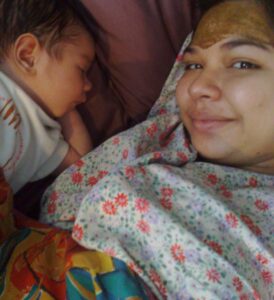
In the Western society, the awareness of the importance of the fourth trimester is growing. Women are acknowledging how the care of our mind, body and spirit is sacred to a wholehearted living. We are more aware how slowing down benefits our mind, how to ask and look for help when we need it eases our anxiety and it begins by creating our village. Many may not have mothers and grandmothers who will drop everything and make us a priority after we have given birth. If you do, that is fantastic but if you don’t, that is where a doula can fill the gap.
A doula’s main commitment is towards the caring and comfort of the pregnant or newborn Mother. An experienced doula will be able to care and guide you holistically from day 1 of your meeting till 6 weeks postpartum and even beyond.
Here are a few things that a doula can help you with your postpartum period:
- During your third trimester, plan how you would like your fourth trimester to look like. It could be meal planning for the 6 weeks, getting freezer meals in the freezer prior to birth-day or it could be assisting you get fresh ingredients which is crucial when it comes to cooking nourishing meals.
- A postpartum doula can help you with light chores like doing your laundry, vacuuming, or doing your dishes.
- Answer your questions and help you navigate breastfeeding time.
- Help in observing your baby’s pattern, understanding his or her cues and support you with this new and exciting change.
- Bathe your newborn baby and or hold baby whilst you have a warm herbal bath (or a much-needed nap).
- Making you foods that will keep your body warm and foods that aids your digestive system.
- Have important contacts like lactation consultants, or women’s health physio or cleaners(!!) handy.
- Lending you books, suggesting resources that may help you prepare your mind for parenting, motherhood and breastfeeding.
- Being a safe space for you to process those vulnerable first few weeks by lending a non-judgemental ear (or two!).
I have listed below resources for further information, and I pray you will have a restorative and wholesome first weeks with your newborn.
YOUTUBE
Malay Rituals
‘pilis’ calming, ‘tapel’ firming, binder, ‘param’ warming
Ayurvedic
Ayurvedic Diet Plan for Postpartum Care | Diet Plan for First 40 Days Post Delivery
Moroccan
The Nafsa Project School Journey
Traditional Chinese
I Tried Chinese Confinement After Giving Birth
Heng Ou on the power of postpartum healing and slowing down
PODCASTS
Malay Postpartum Traditions with Adilah Yelton https://www.atlasofmotherhood.co/membership-classes/malay-postpartum-traditions?rq=adilah
Sabrina of Ummul Herbals and Adilah of Ibu Doula on Vaginal Steam for Labor and Birth
https://www.ibudoula.com/blog/vaginalsteamingforlaborandbirth
https://www.instagram.com/tv/CJ9fYKwgfLt/?utm_medium=copy_link
#51 Traditional Malay Postpartum Care with Adilah
The Little Yarrow Podcast
https://www.ibudoula.com/blog/traditionalmalaypostparumcare
The Soul Mama Podcast with Layla B on Reclaiming Traditional Postpartum Medicine (Episode 1)
https://open.spotify.com/episode/6hqYg9cuOdUqM5IyRc5MGs?si=JGr9plKaSUy0WeAeS1OmUw
BOOKS
Honouring Postpartum Guidebook Digital Book by Sabrina
Postpartum Guidebook | Ummul Herbals
Revive Reclaim Restore by Layla B
BOOK — Layla B.
The First Forty Days by Heng Ou, Amely Greeven and Marisa Belger
The First Forty Days, The Essential Art of Nourishing the New Mother by Heng Ou | 9781617691836 | Booktopia
Newborn Mothers by Julia Jones
https://booko.com.au/w/8069781/Newborn-Mothers-When-a-Baby-is-Born-so-is-a-Mother-_by_Julia-Jones
Nourishing Newborn Mothers by Julia Jones
Nourishing Newborn Mothers: Price Comparison on Booko
Natural Health after Birth: The Complete Guide to Postpartum Wellness by Dr Aviva Romm
https://www.goodreads.com/en/book/show/995325.Natural_Health_after_Birth
The Fourth Trimester by Kimberly Ann Johnson
The Fourth Trimester: A Postpartum Guide to Healing Your Body, Balancing Your Emotions, and Restoring Your Vitality
BLOGS & WEBSITES
Houston Bengkung Belly Binding — IBU DOULA
Traditional practices of caring for mothers after childbirth – Kiwi Families
What to Expect from Postpartum Physical Recovery — Newborn Mothers
Why Is Postpartum Care Important? — Newborn Mothers
Traditional postpartum/confinement practices in Vietnam | Family.My
Traditional Chinese Medicine + Postpartum Traditions | Elissa Pelling
Cambodian Perinatal Culture-Bound Syndromes: Providing Care to Cambodian Women with Toas – EthnoMed
Yu-Fai: the Thai way of healing after birth – Mali Pregnancy & Parenting
BUILD YOUR VILLAGE
Postpartum in Perth – NOURISH ME | Mother Me
Parenting Support – Cocoon Kin
Adilah Yelton (@ibudoula) • Instagram photos and videos
POSTPARTUM CARE AFTER CAESAREAN
Recovery after caesarean: first 6 weeks | Raising Children Network
Postpartum Care After a Caesarean Birth – Community Care Midwives
What To Know About C-SECTIONS + C SECTION AFTER CARE
C-Section Recovery Kit // What You’ll Need For Postpartum // Momma Alia
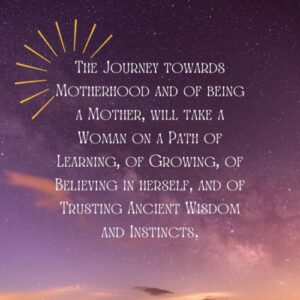
My name is Atheerah the Birthkeeper and I am a doula in training who is completing extensive training at the Doula Training Academy with Vicki Hobbs. If you would like to know if we are a right fit for your journey, please contact me:
Business Name:
Atheerah the Birthkeeper
Email:
[email protected]
Mobile:
0401 308 690

